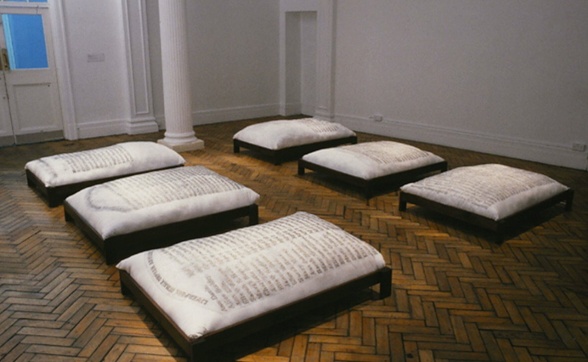Julie Gough
Julie Gough, HOME sweet HOME (Forget Me Not) (installation view), 1999
Julie Gough (b.1965, Melbourne) is an Aboriginal Australian artist who works with ancient and new technologies to negotiate the historical construction of indigenous identities. Although she has previously focused on eighteenth and nineteenth-century explorations of the Australian/Pacific region, Gough is interested in all histories of migration and displacement. Using found objects, photographs and assorted icons of popular culture, she raises questions about the mass production of cultural and personal identity, about history, memory and mythology. She has recently made works that trace her own family history, bringing together her Tasmanian Aboriginal and Celtic ancestors from Scotland.
For TRACE Julie Gough turned her attention to the social history of Liverpool. Since she was exhibiting at Bluecoat Art Centre she took particular interest in the life of orphans in nineteenth-century Britain. On a preliminary research trip she found objects and materials connected with the history of the orphanage. These provided the starting point for her final installation, as she explained:
‘Most of the things I’m working with are materials that children in the Bluecoat School and local Ragged Schools – or children on the streets of Liverpool – handled every day. For example, the Bluecoat children had to manufacture pins for a time in the 1890s. In the Ragged School on Liverpool’s Soho Street (near the National Express bus station) the children had to sort bristles from the early 1850s (I’ve been told these were probably pig bristles), and on the streets children ran around searching for dropped coal pieces. There are many other materials I found references to, but these in particular have stuck in my mind. Initially I want to work with all three, before perhaps narrowing them down to one or two.
I went to two beaches north of Liverpool city to search for materials and clear the cobwebs, and that’s where I collected three bags of coal myself, coming upon it completely by chance."
Julie Gough at Liverpool Biennial 1999
HOME sweet HOME (Forget Me Not), 1999
Mixed media installation
Courtesy of the artists
Exhibited at Bluecoats Arts Centre
Supported by
Qantas Australia
Tontine
Tandou Cotton
Newey Pins
Liverpool Biennial
55 New Bird Street
Liverpool L1 0BW
- T +44 (0)151 709 7444
- info@biennial.com
Liverpool Biennial is funded by
Founding Supporter
James Moores
